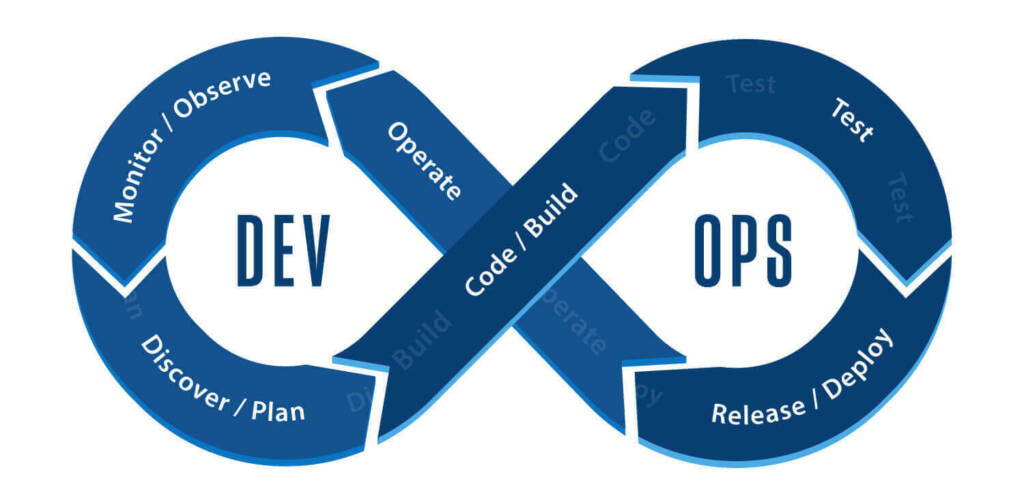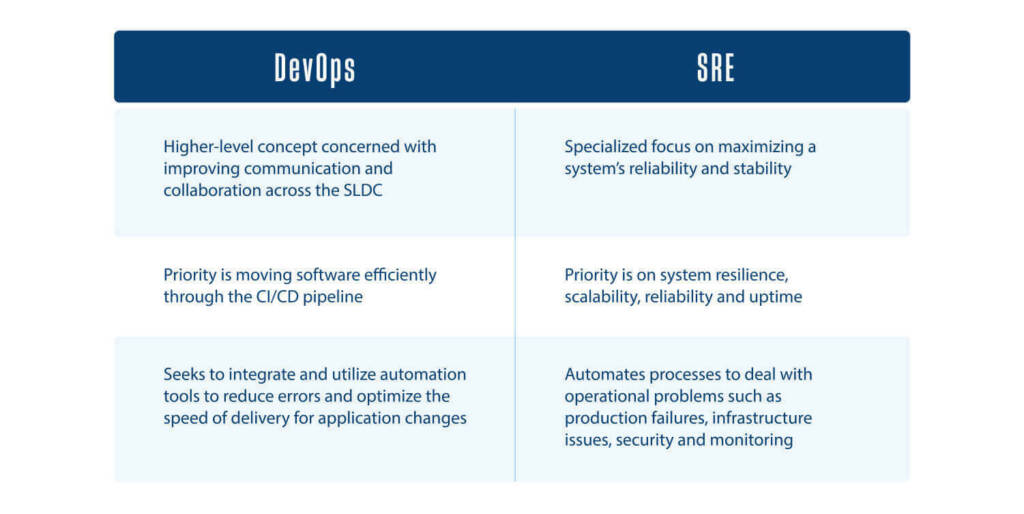What is DevOps? It is:
- An organizational approach and cultural philosophy dedicated to delivering maximum customer value through rapid, reliable and continuous software development and delivery.
- More than a methodology, DevOps represents a transformative shift in how software is developed and deployed, emphasizing tight collaboration, proactive communication and seamless integration between development and IT operations teams.
- A means for organizations to consistently meet customer needs, swiftly adapt to market changes, and enhance overall operational efficiency by focusing on automation, continuous feedback and iterative improvement.
All of these things encompass what is currently making the field of DevOps such an exciting career choice for IT professionals, with the demand for DevOps engineers continuing to exceed the supply of software engineers skilled in DevOps practices.
No matter your specific career path, if you’re interested in advancing your career in information technology, then you’ll want to learn about DevOps and how it’s changing the software delivery chain, expected job roles and industry best practices. Here’s what you need to know.
How Do We Define DevOps?
“DevOps is a cultural movement where both key stakeholder groups (software developers and IT operations) agree that software is not really adding any value until it is used by somebody – customers, clients, employees, etc. Due to this, both teams are ensuring together that software is delivered with speed and quality.” — Eveline Oehrlich, Chief Research Director at DevOps Institute, from the Enterprise Project.
DevOps is more than collaboration between software development (Dev) and production environment operations (Ops). It’s also more than any specific tools or technologies; it is a culture that seeks to unify and automate processes with the goal of optimizing the software development life cycle to deliver value to customers.
DevOps addresses the issues of the traditional software development model, where software development and operations exist separately as two distinct processes. In the DevOps approach, software development is an iterative process that balances the needs of all roles by building trust, collaboration and coordination throughout all parts of the software development lifecycle.
What Problems Does DevOps Solve?
Before DevOps emerged, software development teams often faced significant challenges in delivering tangible business value due to isolated processes and disconnected team priorities. Developers primarily focused on writing and testing code, operations managed deployment and infrastructure separately and testing was frequently delayed until the final stages. This lack of cohesion slowed feedback loops, increased the risk of deployment issues and hindered responsiveness to customer demands.
DevOps solves these challenges by unifying the efforts of development and operations teams around the shared goal of continuously delivering value to the customer. Rather than treating development and operations as separate stages, DevOps integrates them into a cohesive, ongoing process designed to deliver high-quality software rapidly and reliably. This integration allows organizations to respond swiftly to customer feedback and adapt quickly to market changes, enhancing business competitiveness and customer satisfaction.
How Does DevOps Work?
DevOps revolves around continuous integration (CI), continuous delivery and deployment (CD), and continuous monitoring—all aligned toward delivering ongoing customer value. The DevOps cycle is iterative and collaborative, focusing on frequent releases and continual improvement, and is often represented as an infinite loop, where each phase of the SDLC leads into another.

- Discover/Plan: Teams align closely with customer and business needs, setting clear goals and defining how to deliver maximum value through software enhancements.
- Code/Build: Developers produce code efficiently, utilizing automated processes to ensure consistency and speed.
- Test: Continuous automated testing enables rapid identification and resolution of issues, preserving quality and reliability.
- Release/Deploy: Automation ensures seamless and frequent releases, rapidly delivering new features and value to customers
- Operate: The operations team manages a stable environment, ensuring reliable software performance and swift resolution of any issues.
- Monitor/Observe: Continuous monitoring provides insights into software performance and customer satisfaction, guiding further improvements and value creation.
This continuous process is made possible through a few key practices:
- Automation — DevOps engineers utilize automation to speed up all parts of the development process dramatically to increase the efficiency of repeated tasks and reduce the risk of human errors.
- Collaboration and communication — Different teams don’t always have the same priorities and may approach problem-solving from varied perspectives. DevOps asks different teams to get on the same page to understand the issues and constraints at each stage of the SLDC.
- Continuous improvement and minimization of waste — As an evolution of the Lean and Agile methodologies, DevOps asks engineers to employ short feedback loops to continually measure performance metrics to determine which areas need improvement.
- Essential tools — DevOps engineers rely on specific tools to manage the continuous integration / continuous development (CI/CD) pipeline, code repositories, containers and cloud environments essential for their work. Example tools include:
- Git, CVS or Mercurial for source code management and version control
- Ansible or Terraform for automation
- GitLab, Jenkins or CircleCI for CI/CD
- Docker for containerization
- Kubernetes for container orchestration
- Chef or Puppet for configuration management
Rather than creating specific DevOps teams, organizations balance the goals of both development and operations by merging them into one integrated approach. Within a DevOps culture, you don’t brush off issues as “not my department” but approach them as “how do we solve this?”
What Are the Benefits of DevOps?
The main reason more organizations are adopting the DevOps approach is that it offers several significant benefits to organizations, including:
- Reduced stress on development: DevOps helps to alleviate the pressure on development teams by promoting improvements to the entire software delivery pipeline. A combination of streamlined delivery, continuous collaboration and automation and fewer silos help to ensure smoother, more predictable outcomes for everyone.
- Accelerated time to market: DevOps enables more frequent and iterative releases to speed up the SLDC, allowing software to mature gradually and quickly adapt to changing requirements.
- Enhanced flexibility: DevOps empowers teams to respond quickly to market demands and competition, fostering an environment where they can adjust, experiment and implement innovative solutions.
- Improved system stability: Through continuous monitoring and more frequent automated testing, DevOps makes it easier to maintain high levels of system stability and reliability.
- Reduced recovery time: DevOps practices shorten the time it takes to recover from failures or breaches, thanks to automated processes and rapid response capabilities.
- The opportunity for more risk-taking: The iterative nature of DevOps enables teams to take calculated risks and explore new approaches without the constraints of traditional development models, leading to more innovation.
What Are Some Use Cases for DevOps?
There are many scenarios where an organization would benefit from employing a DevOps methodology. Here are two common situations: the need to break down silos and a desire for greater efficiency.
Use Case 1: Teams are too siloed.
A software development team is facing significant delays in code delivery and deployment due to silos between the development, operations and testing teams. Developers focus solely on writing code, while operations handle deployment and infrastructure management, and the testing team only gets involved after development is complete. This lack of collaboration leads to miscommunication, long feedback loops and frequent deployment failures.
The company starts turning things around by adopting a DevOps culture to emphasize shared responsibility across teams. Cross-functional teams are formed, bringing together developers, operations and testers to work collaboratively from the start of the project. Regular communication and collaboration are encouraged through daily stand-ups, joint planning sessions and shared goals.
The team adopts CI/CD pipelines to automate code integration and deployment, reducing manual errors and accelerating release cycles. They implement shared monitoring and logging tools to gain real-time insights into application performance and system health, ensuring proactive issue resolution. Additionally, they leverage Infrastructure as Code (IaC) to automate infrastructure provisioning and configuration management, improving consistency and scalability. With all teams accessing the same dashboards and logs, they establish a feedback-driven approach, holding regular retrospectives to refine processes and continuously enhance collaboration.
This cultural shift leads to faster, more reliable releases with fewer delays and fosters better communication and alignment across teams, resulting in higher-quality software and greater overall efficiency.
Use Case 2: Processes are too inefficient.
A software development team feels that their code integration and deployment processes are too inefficient and are producing too many errors. Each time a developer submits new code, it must be manually tested, integrated and deployed to production. The team wants to streamline these processes to ensure faster, more reliable software releases.
By implementing CI/CD pipelines, the team can automatically test and deploy code changes as soon as they are committed. By adopting a CI tool like Jenkins or CircleCI, the developers can commit their code to a shared repository. Then, every time code is committed, the CI tool automatically triggers a build process, compiles the code and runs a series of automated tests.
With CI in place, the team sets up CD using tools like Jenkins or CircleCI. After the code passes all automated tests, the CD pipeline automatically deploys it to a staging environment. If further testing in staging is successful, the code is then deployed to production.
Utilizing these tools to automate the building, testing, and deployment of applications leads to faster release cycles, higher-quality software and quicker feedback loops, enabling the team to respond rapidly to user needs and market changes. By automating their code integration and deployment processes, the development team experiences significant improvements in efficiency and reliability.
DevOps Vs. SRE
Where DevOps focuses on improving collaboration between development and operations to streamline software delivery and automate processes, Site Reliability Engineering (SRE) applies software engineering principles to operations to optimize system reliability and uptime. Think of DevOps as a broader approach, while SRE is more focused on maintaining and improving system reliability.

How does SRE and DevOps work together?
Both site reliability engineers and DevOps engineers want to automate tasks to improve efficiency. They set up monitoring and logging systems to track application performance, preemptively detect issues and improve incident response and troubleshooting. When they work together, they can identify issues early in the SDLC, automate more processes and build greater resilience into code.
For a more detailed look at the difference between these two approaches, including career roles, key tasks and prospective careers, see our blog post, Key Differences Between SRE and DevOps.
What Is a DevOps Engineer?
DevOps engineers work in both development operations. They implement CI/CD pipelines, manage infrastructure and ensure seamless integration and deployment of code. Their role focuses on improving collaboration, increasing deployment speed and maintaining system reliability. Specific DevOps job responsibilities can include:
- Building managerial tools for projects using scripting and programming languages
- Performing gap analysis to identify performance enhancements and alternative solutions
- Vetting, integrating and utilizing automation tools to further develop the CI/CD pipeline
- Collaborating with other IT professionals on software development projects
- Working with management to improve the software development environment
The salaries of DevOps engineers will vary based on location, experience and company. According to Salary.com, the average DevOps salary will range between $115,863 and $144,227
For a more in-depth look at the role of DevOps engineer, including similar careers, see our blog post: How to Become a DevOps Engineer [+Career & Salary Guide].
Why Choose a Career as a DevOps Engineer?
A career as a DevOps engineer uniquely positions you to accelerate the delivery of value in your organization. DevOps engineers bridge critical gaps between development and operations, streamlining processes to deliver reliable, customer-focused software. By mastering automation tools, infrastructure management and continuous integration/deployment practices, DevOps engineers significantly shorten release cycles, enhance product quality and increase organizational agility.
Specific responsibilities for DevOps engineers that directly impact value delivery include:
- Building automated systems that enable rapid, reliable deployment and updates
- Continuously monitoring systems to proactively address performance issues and enhance reliability
- Implementing feedback loops to incorporate customer insights and requirements quickly
- Driving collaboration between teams to ensure alignment on delivering customer-focused outcomes
The skills and approaches you develop as a DevOps engineer are critical to ensuring your organization can efficiently deliver high-quality software solutions that meet evolving customer expectations and competitive demands.
How To Prepare For a DevOps Career?
To thrive as a DevOps engineer, focus on gaining a robust understanding of software development and operational practices. You should:
- Master at least one relevant coding language (e.g., Python, Ruby, Java)
- Obtain a relevant degree or certification focused on software engineering, IT leadership or DevOps
- Build hands-on experience in creating automated CI/CD pipelines and managing infrastructure as code (IaC)
- Cultivate a deep understanding of how different roles in software development collaborate to deliver customer-centric outcomes
Embracing DevOps equips you with the mindset and tools to deliver continuous, measurable value — ensuring you can significantly impact your organization’s success.





